Japan’s national high-school soccer tournament is thriving after more than 100 years, attracting huge crowds, millions watching on TV and breeding future stars, despite professional clubs trying to attract young talent.
The annual tournament kicked off on Saturday and is still regarded as the pinnacle of amateur soccer with young players dreaming of playing in the final in front of tens of thousands at the National Stadium in Tokyo.
Matches are a massive occasion for the whole school as student cheering squads wave flags, bang drums and roar on their teams in a spectacle of noise and color.
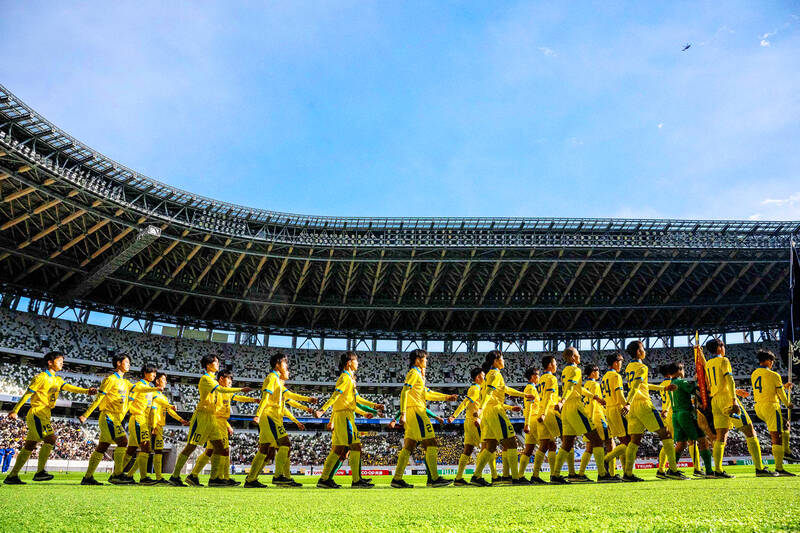
Photo: AFP
“All the teams are at a similar level of technical ability, so it’s about who wants to win the most,” said 18-year-old Junpei Fukuda, the leader of Ryutsukeizai University Kashiwa High School’s cheering squad.
“We want our voices to be the loudest,” Fukuda said.
Unlike in Europe, where young players are snapped up by professional club academies, high-school soccer in Japan still attracts elite talent.
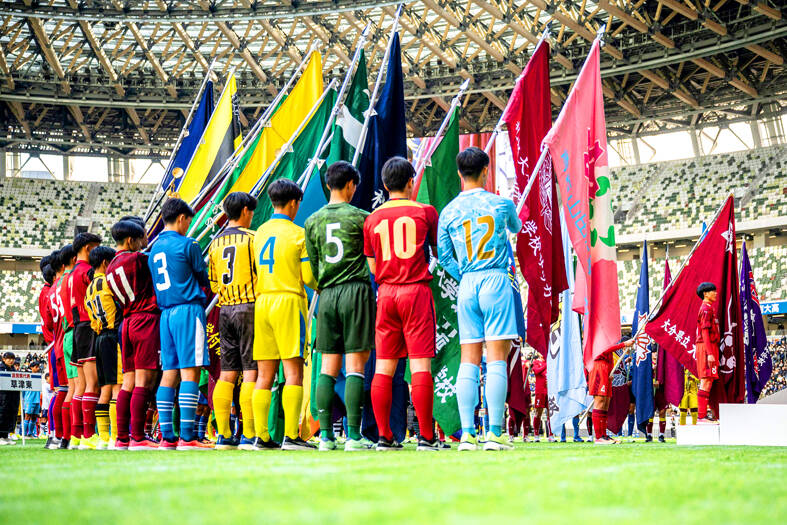
Photo: AFP
Many go on to the professional game and play for their country with Japan stars such as Daizen Maeda and Reo Hatate of Celtic, and Crystal Palace’s Daichi Kamada all having played high-school soccer.
The landscape has begun to change over the past few years, with more top young players turning their backs on the high-school game and joining the youth teams of top-flight J.League clubs instead.
The school tournament’s quality has taken a hit as a result, but its magic endures for many.
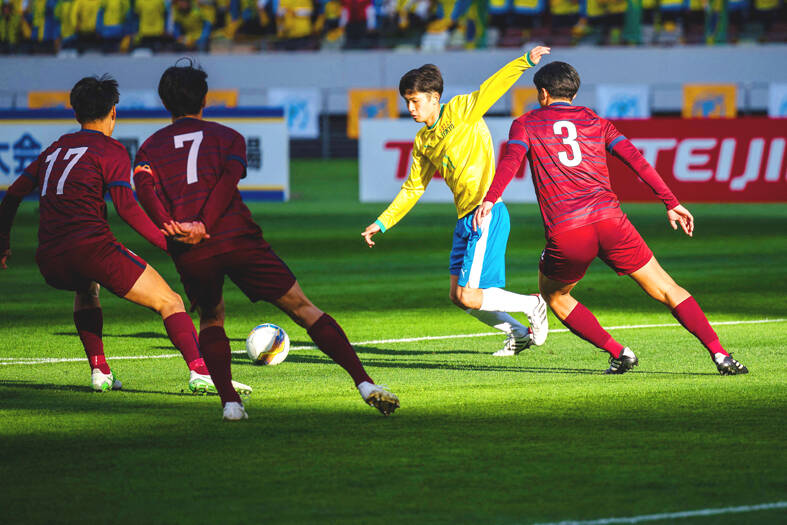
Photo: AFP
Ryutsukeizai Kashiwa midfielder Kanaru Matsumoto, who would turn professional with the J.League’s Shonan Bellmare next year, said the tournament was “the stage I’ve aspired to play on ever since I was little.”
“The main reason I came to this school was because I thought I could play at the national high-school tournament here,” the 17-year-old said.
The national high-school tournament was first played in 1917, long before professional soccer came to Japan with the J.League in 1993.
Teams from each of Japan’s 47 prefectures, with two from Tokyo, compete in a knockout competition over 18 days with matches played in and around the capital.
All games are televised locally and the semi-finals and final are broadcast to a national audience, with millions tuning in.
Last season’s final in Tokyo was played in front of 55,000 fans, comfortably eclipsing most J.League attendances.
High-school baseball and rugby tournaments are also popular and soccer journalist Masashi Tsuchiya said it was because school sports strike a chord in Japan.
“I’m from Gunma Prefecture and I always support the Gunma team, even if it isn’t my old high school’s team,” he said. “It’s a tournament that places importance on local pride and old school ties.”
Not all players who appear at the tournament have ambitions to play at the top level.
Some play on at university only, while others give up the sport after graduating from high school.
The tournament marks a transition after three years together as a team, Ryutsukeizai Kashiwa manager Masahiro Enomoto said.
“It’s where kids, who have worked really hard for something, become adults,” he said.
TV broadcasts of games go beyond events on the pitch, delving into the players’ back stories, playing up emotional bonds and featuring scenes of beaten teams in floods of tears.
“Japanese people love that kind of drama more than they think about the quality of the football,” even though the standard remains undoubtedly high, Enomoto said.
School sides still hold their own against J.League youth teams, who are increasingly regarded as a better route to the professional game.
The nationwide Prince Takamado Under-18 Premier League features a roughly even split of high school and J.League youth teams, and Ohzu High School were crowned this year’s champions.
High-school soccer should not be thought of only as a stepping stone to the top, Tsuchiya said.
“Yes, you can watch it for the quality of football and the quality of the players,” he said. “But you can also just enjoy watching the kids give everything they’ve got to try to win each game.”
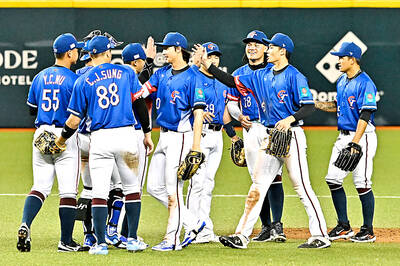
Taiwan kept its hopes of advancing to the 2026 World Baseball Classic (WBC) alive with a 9-1 victory over South Africa in a qualifier at the Taipei Dome last night, backed by solid pitching. Bouncing back from Friday’s struggles on the mound, when Taiwanese pitchers surrendered 15 runs to Spain, Team Taiwan kept the visiting team in check, allowing just one run in the bottom of the fourth inning. The win was crucial for Taiwan, as a loss would have eliminated the team from contention for the next WBC. Starting pitcher Sha Tzu-chen (沙子宸) struck out one and allowed no hits, except for
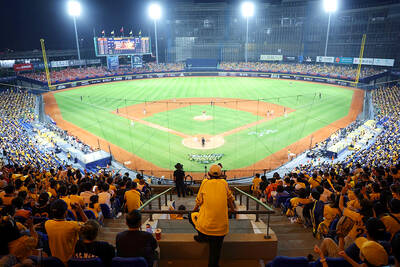
The Chinese Professional Baseball League (CPBL) is considering reducing its pitch clock by two seconds to help players better adjust to the rules applied at the World Baseball Classic (WBC). The proposal aims to shorten the pitch timer from 25 seconds to 23 seconds with the bases empty, and from 20 seconds to 18 seconds with runners on base. Currently, the WBC mandates that pitchers deliver a pitch every 18 seconds with the bases empty and 15 seconds with runners on base. The issue was raised during a pre-season CPBL managers’ meeting on Tuesday by Rakuten Monkeys bench and batting

‘SETTING THE TONE’: Donovan Mitchell said that their determination to dominate had nothing to do with past results, but was about a potential post-season clash The Cleveland Cavaliers on Friday boosted their NBA-best record with a 142-105 romp past the New York Knicks, tightening their grip on the Eastern Conference lead with an all-around dominant display. Donovan Mitchell scored 27 points to lead six Cavs players to score in double figures, connecting on five of seven three-pointers as Cleveland drilled 19 from beyond the arc. “I think the biggest thing was just try to set the tone early,” Mitchell said, adding that the determination to dominate had nothing to do with the Knicks’ first-round playoff win over the Cavs two seasons ago and everything to do with
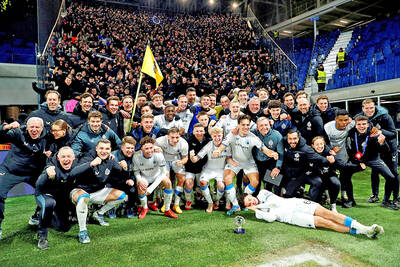
BELGIANS ADVANCE: Club Brugge gave Atalanta a lesson in efficiency, as Gian Piero Gasperini’s team had 29 efforts at goal, compared with seven from the visitors Seldom has a player’s sending off had such an influence on a game. AC Milan was to left rue Theo Hernandez’s second yellow card — for diving — as Feyenoord advanced to the UEFA Champions League last 16 at the former European champion’s expense with a 1-1 draw in the second leg of their playoff on Tuesday, giving the Dutch team a 2-1 win on aggregate. Bayern Munich, Club Brugge and Benfica also won their playoffs, eliminating Celtic, UEFA Europa League winner Atalanta BC and French team AS Monaco respectively. “In soccer everything changes in a second,” said Milan forward